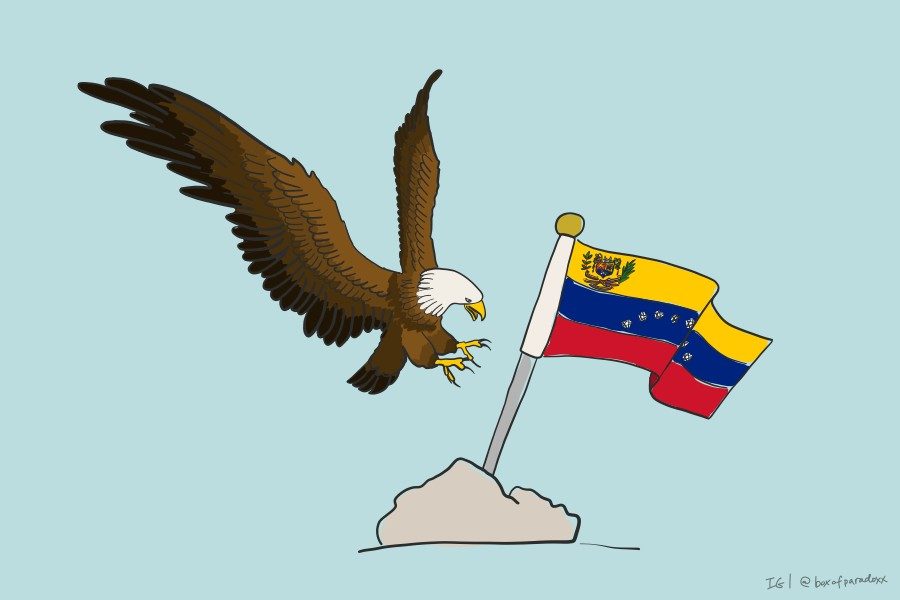Possible U.S. intervention in Venezuela prompts remembrance of past crimes in Latin America
This past Tuesday night, President Donald Trump delivered his State of the Union address. Though his primary audience was the American people, countries from around the world also served as spectators, with their media providing coverage as well. Among them, Venezuela, watching closely.
Venezuelan newspaper El Universal aimed to disprove many of the notable stances in President Trump’s speech, including immigration policy and diplomacy with Mexico and Canada. This is merely symbolic of Nicolás Maduro regime’s current opposition toward the U.S., especially toward President Trump.
In the past, Trump’s statements on Venezuela attributed the country’s “anguish, devastation and failure” to one thing: socialism. Venezuela’s situation is complex, and many of the inaccuracies in Trump’s statements have trickled down to other Americans, shaping their perceptions of the country and its people.
“Unfortunately, I feel like [many Americans’] opinions are based on defending whatever economic system they idolize and not on the fact that Venezuelans live, and have been living for many years now, under constant fear of starvation, violence and illness,” former TU Gente President Patrizia Santos said. Santos is from Caracas, Venezuela.
Venezuela’s recent economic downfall is much more complicated than the decades-old battle between socialism and capitalism can account for. It is an often-dark history of authoritarianism, corruption, hyperinflation and the crashed value of the nation’s most prized resource: oil.
In fact, Venezuela is home to the world’s biggest oil reserves, surpassing major competitors like Saudi Arabia and Canada. For many, however, the impact the Venezuelan government has had on its people is felt even more intensely than the impact of the economy.
“My wish is for Americans who I know [to] care about what is happening to the people in Venezuela, to stop and listen to the actual perspective of Venezuelans, look at the actual facts, and form an opinion for themselves instead of repeating a long history of American moral high ground and bipartisanship,” sophomore Annelies Smilde, who is also from Caracas, said.
Recently, Trump announced his administration’s support for Juan Guaidó, who declared himself as the new interim president of Venezuela under the credible allegations that Maduro rigged the 2018 election to re-elect himself as the authoritative president of the country. In addition, Trump stated he was open to U.S. military intervention against Maduro, if need be.
“I am very happy that America, along with other countries, is recognizing Guaidó,” sophomore Fabiana Lacau, a Venezuelan-American from Miami, said. “However, I am extremely aware of the U.S.’ history with intervention and imperialism. I think that humanitarian support and speaking out and educating the American public on the situation is the right way to go about it.”
The U.S. has a very controversial history of relations with not just Venezuela, but several other Latin American countries. One example is the Central-American nation of Honduras.
In the early 20th century, U.S. fruit corporations had enough power to provide Honduras with railroads, banks and infrastructure. This gain, however, was achieved through bribing the Honduran government, and in exchange allowing the companies to monopolize on the country’s fruit production, while underpaying and overworking Honduran workers in the process. This established Honduras as a banana republic at the time.
Among those corporations that exploited Honduras’ resources and people was United Fruit Company, led by Samuel Zemurray. Zemurray was a major financial contributor to the founding of Tulane’s Roger Thayer Stone Center for Latin American Studies. Zemurray Pavilion, a building of Willow Residences, bears his name. In addition, the President’s Mansion on St. Charles Avenue is the former residence of Zemurray, now titled to Tulane President Mike Fitts.
U.S. involvement in Honduras is only a single, early example of how the U.S. has drastically impacted Latin America. Other Latin American nations that became targets of U.S. involvement were El Salvador, Guatemala, the Dominican Republic, Mexico, Panama, Nicaragua, Cuba, Colombia, the U.S. territory of Puerto Rico and more.
“Do I truly believe in the current administration? No,” Lacau said. “Do I think that they have great intentions? No. I know the amount of times America has invaded and then worsened a country and I do not support a military coup in Venezuela through the American military.”
“An invasion would likely mean civilian casualties, loss of infrastructure and ultimately having to spend resources on rebuilding the damage that’s left behind,” Smilde said. “But on the other hand, people have been suffering for far too long and something needs to change.”
The future of Venezuela and Trump’s possible actions remain a huge question, leading many Venezuelans to ponder how this complicated situation regarding the nation they love will develop in the coming months.
“The situation in Venezuela does not exist on a binary – even though thats how its being treated.” Lacau said. “You do not have to either support Guaidó and U.S. imperialism or support Maduro and socialism. I hope this will garner empathy and support for the Venezuelan people worldwide and get more people to want to help.”
Your donation will support the student journalists of Tulane University. Your contribution will allow us to purchase equipment and cover our annual website hosting costs.




Pawel • Feb 7, 2019 at 2:49 pm
The potential invasion is driven by the fact that Venezuela does not want to support oil sales in American dollars. Forget socialism vs capitalism rhetorics:
https://www.reuters.com/article/us-venezuela-oil-idUSKCN1BQ2D1